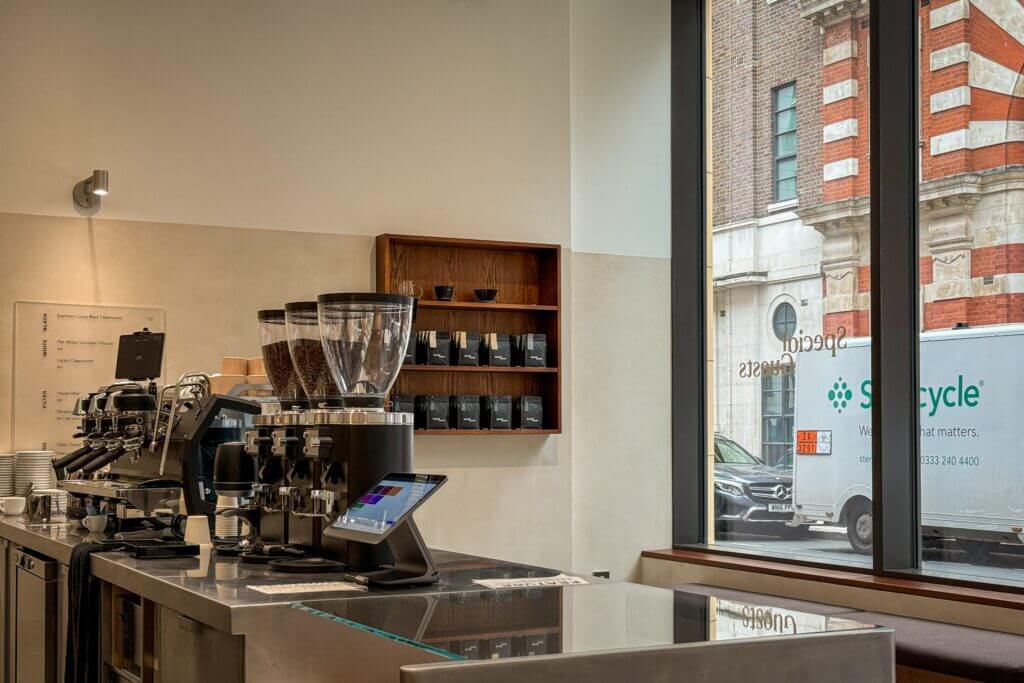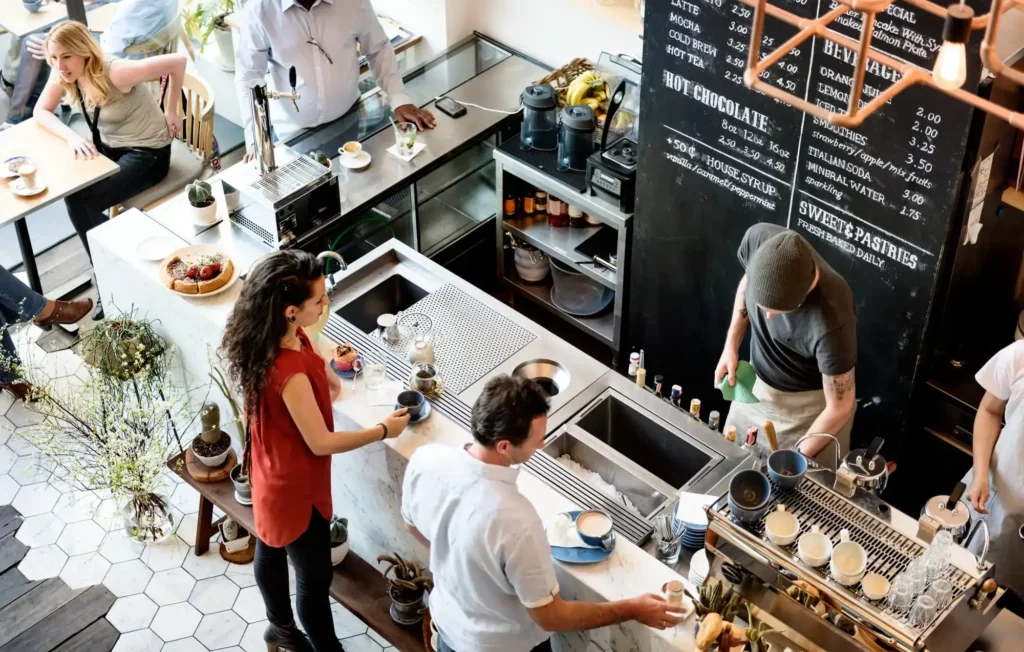Blog
UK Best Coffee Shop: A Complete Guide to Finding Your Perfect Brew

Introduction
Coffee has become more than just a drink—it’s a lifestyle. Across the UK, coffee shops have blossomed into cultural hotspots, attracting students, professionals, travelers, and anyone who loves the aroma of freshly brewed beans. The question many coffee enthusiasts ask is: What is the UK’s best coffee shop? The answer depends on what you value most—whether it’s the bold flavor of a single-origin espresso, the cozy vibe of a rustic café, or the innovation of a modern specialty shop.
This guide dives deep into the UK’s thriving coffee culture, exploring not just famous names but also hidden gems across cities like London, Manchester, Edinburgh, and Bristol. Whether you’re a local looking for your new favorite spot or a traveler wanting to sip your way through Britain, this article is your ultimate map to the UK’s best coffee shops.
The Rise of Coffee Culture in the UK
Traditionally, the UK has always been associated with tea. Afternoon tea, Earl Grey, and scones have long dominated the nation’s beverage identity. But over the past two decades, coffee has staged a remarkable takeover. Walk through any high street, and you’ll notice coffee shops everywhere—from global giants like Starbucks and Costa to independent cafés roasting their own beans.
This rise isn’t accidental. The UK has embraced the global “third wave coffee movement,” where quality, origin, and brewing method matter just as much as taste. Independent coffee shops have taken center stage, offering customers more than just caffeine—they provide experiences. Whether it’s latte art workshops, pour-over masterclasses, or simply a welcoming space to relax, these shops redefine what it means to enjoy coffee.
As a result, cities like London and Manchester have become internationally recognized for their coffee culture. Tourists now include café-hopping in their itineraries, just as they would visiting museums or historic landmarks. Coffee has become an identity marker, a way for communities to connect, and an essential part of daily life in the UK.
What Defines the Best Coffee Shop?
When we talk about the “UK best coffee shop,” it’s not just about who makes the strongest flat white. Several factors combine to create a truly memorable coffee experience:
- Quality of Coffee Beans
The best shops prioritize ethically sourced, freshly roasted beans. Many work with local roasters or even roast in-house, ensuring unique flavor profiles that reflect their brand. - Atmosphere and Vibe
A great coffee shop is more than just a caffeine pitstop. It’s a place where you feel comfortable working on your laptop, catching up with friends, or simply people-watching with a cappuccino in hand. The design, music, and seating all play a role. - Customer Service and Consistency
You might remember the taste of a good espresso, but you’ll never forget how you were treated. Friendly baristas who care about their craft elevate a shop from average to exceptional. Consistency also matters—each visit should offer the same quality. - Innovation and Uniqueness
From nitro cold brew taps to oat-milk-only menus, innovation sets apart the UK’s most beloved coffee shops. Customers love when cafés push boundaries while staying true to the coffee experience.
When these elements come together, you’ve found a place worth calling the best.
London’s Best Coffee Shops
London is undeniably the capital of the UK coffee scene. The city is packed with hundreds of coffee shops, each offering something unique. While chains dominate central London, it’s the independents that truly shine.
Some highlights include:
- Monmouth Coffee – Famous for its artisanal approach and queues that often stretch around the block. Their single-origin beans are beloved by coffee purists.
- Kaffeine – Inspired by the Australian coffee culture, this café is all about precision brewing and high-quality service.
- Prufrock Coffee – A must-visit for espresso lovers, offering training and tasting sessions alongside their perfectly crafted drinks.
- The Attendant – Known for its quirky setting inside a restored Victorian toilet, this café is both Instagram-worthy and delicious.
London’s coffee culture is also about exploration. Each neighborhood has its own gems—Shoreditch for hipster vibes, Soho for creative blends, and Notting Hill for cozy, stylish cafés. With so many options, London can easily overwhelm you, but the joy is in discovering a new favorite spot each time.
Best Coffee Shops in Manchester
Manchester, with its creative energy and industrial heritage, has also carved out a strong coffee culture. The Northern Quarter, in particular, is a hotspot filled with quirky independent cafés that double as community hubs.
- Takk – Inspired by Icelandic café culture, Takk is known for its strong Nordic-style coffee and rustic interiors.
- Pot Kettle Black – A modern café that combines great food with exceptional specialty coffee, perfect for brunch lovers.
- Foundation Coffee House – A bright, airy spot designed for co-working, serving specialty brews that keep locals coming back.
- Idle Hands – Famous for both their specialty coffee and their pies, blending creativity with comfort.
What makes Manchester’s coffee scene stand out is its authenticity. These are not cafés trying to replicate London’s trends—they have their own identity, rooted in the city’s artistic and cultural heartbeat. Whether you’re sipping a V60 while sketching in a notebook or catching up with friends over flat whites, Manchester offers some of the best coffee experiences outside the capital.
Edinburgh’s Coffee Scene
Edinburgh, Scotland’s historic capital, is more than just cobblestone streets, castles, and bagpipes—it’s also a hub for exceptional coffee. The city has embraced specialty coffee in recent years, making it a haven for those who love both tradition and innovation in their cup. What sets Edinburgh apart is its balance between cozy, old-world charm and forward-thinking, modern coffee culture.
One of the must-visit places is Brew Lab, a café dedicated to precision brewing. Known for its scientific approach, it offers a range of brewing methods including pour-over, Aeropress, and cold drip. For those who enjoy a minimalist Scandinavian vibe, Fortitude Coffee provides both beautifully roasted beans and a peaceful escape from the city bustle. Meanwhile, The Milkman, with its rustic interior inside a historic sweet shop, is perfect for those who crave atmosphere with their latte.
Edinburgh’s coffee culture also thrives on local roasters. Many cafés work directly with Scottish roasteries like Artisan Roast and Williams & Johnson, ensuring freshness and supporting small businesses. Whether you’re wandering through Old Town or exploring the vibrant Leith area, you’re never far from a café that takes its coffee seriously. For tourists, it’s not just about the drink—it’s about experiencing the city’s rich culture in every sip.
Bristol’s Independent Coffee Culture
Bristol has quietly built one of the UK’s most exciting coffee scenes, driven largely by its independent spirit and strong sense of community. Unlike cities dominated by chains, Bristol thrives on creativity and individuality, with cafés that reflect the city’s artistic energy.
One standout is Small Street Espresso, a tiny but mighty café known for its expert brewing and dedication to showcasing guest roasters. Another favorite is Full Court Press, where coffee is treated almost like fine wine—each cup is carefully crafted, with baristas eager to share tasting notes and brewing insights. For those who love a café with a community feel, Spicer+Cole is a local chain with several locations, blending excellent coffee with wholesome food options.
What makes Bristol unique is its strong relationship with local roasters. Many cafés here partner with ethical roasters to highlight seasonal beans, ensuring that every visit feels different. The city also hosts coffee festivals, celebrating not just the beverage but also the craft and culture behind it.
If you’re looking for a city where coffee is more than just a trend, Bristol should be on your radar. Its independent cafés embody a lifestyle—creative, eco-conscious, and community-focused—making it one of the UK’s best coffee destinations.

Specialty Coffee Trends in the UK
The UK coffee scene isn’t just about where you drink your latte—it’s also about how it’s made and what’s trending in the world of specialty coffee. Over the past decade, a wave of innovation has transformed how people enjoy their brew.
- Third-Wave Coffee Movement
This trend emphasizes transparency, quality, and craftsmanship. Coffee is no longer just a caffeine fix—it’s treated like fine dining, with emphasis on origin, farming practices, and roasting techniques. - Alternative Brewing Methods
Beyond the standard espresso machine, cafés are now offering pour-overs, siphon brewing, Aeropress competitions, and even nitro cold brews on tap. These methods highlight different flavor notes and give customers a more interactive experience. - Plant-Based and Dairy Alternatives
With the rise of plant-based lifestyles, oat milk has become a staple in UK coffee shops, often surpassing almond or soy due to its creamy texture. Many cafés now offer a fully plant-based menu. - Sustainability in Focus
From reusable cups to zero-waste policies, sustainability is shaping how UK coffee shops operate. Customers are more conscious, and cafés are responding with eco-friendly practices.
These trends show that the UK isn’t just keeping up with global coffee culture—it’s actively shaping it. For coffee lovers, this means endless opportunities to try new flavors, brewing styles, and experiences.
How to Choose the Right Coffee Shop for You
With so many options across the UK, finding the “best” coffee shop can feel overwhelming. But the truth is, the perfect coffee shop depends on you—your tastes, preferences, and lifestyle. Here are some tips to help narrow down your choices:
- If you’re a coffee purist: Look for cafés that roast their own beans or partner with specialty roasters. Shops like Monmouth in London or Full Court Press in Bristol are ideal.
- If atmosphere matters most: Seek out cafés with cozy interiors, quiet corners, or unique vibes—such as The Milkman in Edinburgh or The Attendant in London.
- If you’re working remotely: A spacious café with reliable Wi-Fi and lots of outlets, like Foundation Coffee House in Manchester, will be your best bet.
- If food matters too: Some cafés are known for pairing coffee with incredible food. Places like Pot Kettle Black in Manchester or Spicer+Cole in Bristol strike the perfect balance.
- If you’re budget-conscious: While specialty coffee can be pricey, many smaller independent cafés offer high quality at reasonable prices compared to bigger chains.
The key is to match your expectations with what the café offers. Some people want an artisanal, one-of-a-kind brew. Others simply want a cozy place to relax with friends. Once you know what matters most, the “UK best coffee shop” becomes a personal choice rather than a universal title.
Sustainability in UK Coffee Shops
In today’s world, sustainability isn’t just a buzzword—it’s a necessity. Coffee shops across the UK are embracing eco-friendly practices, and this shift is redefining what it means to be the “best.” More than ever, customers are making choices based not only on taste but also on environmental responsibility.
One of the most significant changes is ethical sourcing of beans. Many UK cafés now partner with farms that practice fair trade, direct trade, or organic farming. This ensures that coffee growers receive fair wages while also promoting environmentally conscious farming practices. Shops like Origin Coffee Roasters and Workshop Coffee lead the way in transparent sourcing, allowing customers to trace their cup back to the farm.
Eco-friendly practices go beyond the beans themselves. Many cafés have introduced zero-waste initiatives, offering discounts to customers who bring reusable cups, switching to compostable packaging, or even recycling coffee grounds for local gardens. In Bristol, for example, some cafés collaborate with community projects that turn used coffee grounds into fertilizer.
Another growing trend is the shift toward plant-based menus. Offering oat, almond, or soy milk not only caters to dietary preferences but also reduces the carbon footprint of coffee consumption. In fact, some UK cafés are now fully vegan, showcasing that sustainability and taste can go hand-in-hand.
For eco-conscious coffee lovers, this new wave of sustainable cafés is more than refreshing—it’s empowering. Choosing a café that values the planet allows customers to enjoy their favorite brew while contributing to positive change. In many ways, sustainability has become the new standard for what makes a coffee shop “the best” in the UK.
Food and Coffee Pairings
A great cup of coffee can stand alone, but when paired with the right food, it transforms into an unforgettable experience. Across the UK, cafés are elevating their menus by pairing specialty coffee with artisanal baked goods, hearty breakfasts, and even fine dining-inspired snacks.
The classic pairing, of course, is coffee with pastries. Croissants, pain au chocolat, and cinnamon buns remain timeless favorites. Independent cafés often source from local bakeries, ensuring freshness while supporting the community. Shops like Idle Hands in Manchester have built a reputation not just for their coffee but also for their famous pies.
But food and coffee pairings in the UK go well beyond pastries. Many cafés now specialize in brunch menus, offering avocado toast, shakshuka, or sourdough sandwiches alongside flat whites and cappuccinos. This trend has made coffee shops an all-day destination rather than just a morning stop.
Regional specialties also shine in certain areas. In Edinburgh, you might find Scottish shortbread or oatcakes paired with strong espresso. In London, international influences dominate, from Italian biscotti to Middle Eastern-inspired pastries.
Interestingly, some cafés are now experimenting with coffee and dessert pairings. Think affogatos (espresso poured over ice cream) or coffee tasting menus where each course is paired with a different roast. This culinary approach adds a layer of sophistication and creativity, showing how versatile coffee can be.
Ultimately, the best food and coffee pairings enhance both flavors, creating a harmony that leaves customers craving more. For many, these pairings are what transform a simple coffee break into a full dining experience.

The Role of Coffee Shops in Community Building
Coffee shops in the UK are not just about coffee—they’re about connection. In an age where many people work remotely or live fast-paced lives, cafés have become vital community hubs. They are spaces where strangers become friends, where ideas are shared, and where local culture thrives.
Take Manchester’s Northern Quarter cafés, for example. These spots aren’t just serving lattes; they’re hosting open mic nights, art exhibitions, and book clubs. Similarly, in London’s Shoreditch, coffee shops often double as co-working spaces, attracting freelancers and entrepreneurs who thrive in collaborative environments.
For students, coffee shops often become study havens. Universities across the UK are surrounded by cafés filled with students preparing for exams, sipping flat whites, and typing away on laptops. These spaces provide a balance of focus and relaxation, making them essential parts of student life.
Beyond work and study, many coffee shops also champion local causes. From fundraising for charities to promoting eco-friendly initiatives, cafés often play a bigger role in shaping the values of their community. They’re not just businesses—they’re cultural anchors.
The best coffee shops in the UK understand this role deeply. They design their spaces with inclusivity in mind, encourage conversation, and create a welcoming atmosphere for everyone. For many people, the local café isn’t just a place to grab a caffeine fix—it’s a second home.
Future of Coffee Shops in the UK
The UK coffee scene continues to evolve, and the future looks both exciting and innovative. Technology, sustainability, and customer experience are at the heart of this transformation.
One of the biggest shifts is technology integration. Mobile apps, online ordering, and contactless payments are already widespread, but some cafés are taking it further with subscription models or personalized loyalty rewards. Customers can now pre-order their flat whites before arriving, saving time while ensuring convenience.
At the same time, the specialty coffee movement shows no signs of slowing down. Expect to see more experimental brewing methods, unique flavor infusions, and limited-edition single-origin beans. Coffee tasting flights, where customers sample several brews in one sitting, are likely to become more common.
Sustainability will also play a bigger role in shaping the future. From carbon-neutral cafés to innovative packaging solutions, the UK coffee industry is pushing toward greener practices. In fact, we may soon see cafés adopting “farm-to-cup transparency” as a standard, where every customer knows exactly how their coffee was grown, processed, and delivered.
Finally, the role of coffee shops as community spaces will only grow. With more people working remotely, cafés are evolving into hybrid spaces—part office, part social hub. This dual function ensures that coffee shops remain essential in everyday life.
The UK’s coffee culture is no longer about catching up with global trends—it’s about setting them. The next decade promises even more creativity, sustainability, and innovation, ensuring that the hunt for the “UK best coffee shop” will always be an exciting journey.
Tips for Tourists: Exploring UK Coffee Culture
For travelers, exploring coffee culture is one of the best ways to experience a country’s local flavor—and the UK is no exception. If you’re visiting, here are some tips to make the most of your coffee adventures:
- Skip the Chains – While Costa and Starbucks are convenient, the real magic lies in the independents. Seek out small cafés for unique brews and authentic vibes.
- Explore Different Cities – London is a coffee powerhouse, but don’t miss Manchester’s creativity, Edinburgh’s charm, or Bristol’s independence. Each city has its own coffee personality.
- Join a Coffee Tour – Many UK cities now offer guided coffee trails, where you can sample brews from multiple cafés in one afternoon. It’s a great way to learn and taste at the same time.
- Ask the Barista – Don’t be shy! Most UK baristas are passionate about their craft and love recommending their favorite drinks or beans.
- Try Local Pairings – Whether it’s Scottish shortbread in Edinburgh or artisan pies in Manchester, pairing your coffee with local specialties makes the experience richer.
By stepping off the beaten path and embracing local culture, you’ll discover why the UK has become one of the most exciting coffee destinations in the world.
Conclusion
The hunt for the UK best coffee shop is a journey rather than a destination. From London’s bustling café culture to Manchester’s creative Northern Quarter, Edinburgh’s charming hideaways, and Bristol’s independent gems, every city offers something unique. The best coffee shop isn’t just about the coffee itself—it’s about atmosphere, sustainability, food pairings, and community spirit.
Whether you’re a tourist exploring Britain or a local searching for your next favorite brew, the UK coffee scene has something for everyone. So grab your reusable cup, explore new neighborhoods, and savor the experience. The next “best coffee shop” might just be around the corner.

Blog
Cole Tucker Net Worth: An Overview

When people search for Cole Tucker net worth, they’re often curious about how a professional baseball career translates into real-world wealth—especially when paired with celebrity attention and a high-profile personal life. Cole Tucker is not the type of athlete who exploded onto the scene with a billion-dollar contract. Instead, his financial story is more grounded, realistic, and relatable. It’s a journey shaped by discipline, athletic talent, perseverance, and smart career choices rather than overnight superstardom.
As of recent estimates, Cole Tucker’s net worth is believed to be between $3 million and $5 million. This wealth has been accumulated through MLB contracts, signing bonuses, endorsements, and various off-field opportunities. While he may not rank among the highest-paid baseball stars, his income trajectory reflects stability and long-term potential rather than flashy peaks. Think of it like building a house brick by brick—solid foundations matter more than flashy rooftops.
What makes Tucker’s financial profile especially interesting is the blend of sports earnings and pop-culture exposure. His relationship with actress Vanessa Hudgens significantly increased his public visibility, opening doors beyond the baseball diamond. This article breaks down exactly how Cole Tucker built his wealth, where his money comes from, and what the future may hold.
Early Life and Background of Cole Tucker
Cole Bryson Tucker was born on July 3, 1996, in Phoenix, Arizona. From a young age, baseball wasn’t just a hobby—it was a way of life. Growing up in a sports-oriented household, Tucker showed exceptional athletic ability early on, particularly in baseball. His parents supported his ambitions wholeheartedly, often traveling for games and tournaments, investing both time and resources into his development.
He attended Mountain Pointe High School, where his performance on the baseball field began turning heads. Tucker wasn’t just good; he was consistent, disciplined, and mentally sharp. These traits would later become key contributors to his professional success. During his teenage years, he also gained experience competing against elite talent, which prepared him mentally for the challenges of professional sports.
This early foundation didn’t directly add to Cole Tucker net worth, but it played a critical role in setting him up for future financial success. Without years of training, sacrifice, and support, there would be no contracts, endorsements, or career earnings to speak of. Like most athletes, his net worth story began long before the money ever showed up.
College Years and Path to Professional Baseball
Unlike many players who commit fully to college baseball, Cole Tucker’s journey took a slightly different route. He committed to Arizona State University, a powerhouse known for producing elite MLB talent. However, his professional prospects became so strong that college baseball became more of a backup plan than a necessity.
Scouts quickly noticed Tucker’s defensive skills as a shortstop, his athleticism, and his baseball IQ. By his senior year of high school, it was clear that his future lay in professional baseball rather than the NCAA. This early recognition significantly influenced his earning potential, as high draft placement often translates into larger signing bonuses.
While he didn’t spend years earning a college salary—because college athletes don’t get paid—this period was crucial for increasing his draft value. In the world of professional sports, potential is currency, and Tucker’s potential was steadily rising.
MLB Draft and Signing Bonus
The real financial journey began in 2014 when Cole Tucker was selected in the first round of the MLB Draft by the Pittsburgh Pirates. Being drafted 24th overall is a major milestone, both professionally and financially. With that selection came a signing bonus of approximately $1.8 million, instantly boosting Cole Tucker net worth before he ever played a single MLB game.
This signing bonus alone placed him ahead of many peers financially. Unlike annual salaries, signing bonuses are guaranteed money, providing immediate financial security. For a teenager fresh out of high school, this was life-changing.
However, it’s important to note that taxes, agent fees, and training expenses reduce the actual take-home amount. Still, the draft marked the moment Tucker officially entered the world of professional wealth.
Cole Tucker’s Professional Baseball Career
Minor League Journey
After signing with the Pirates, Tucker spent several years in the minor leagues. Minor league baseball is often misunderstood—while players are professionals, the pay is relatively modest compared to the MLB. During this period, Tucker’s income was steady but not extravagant.
However, minor league development is an investment phase. The goal isn’t immediate wealth; it’s long-term career sustainability. Tucker continued refining his skills, improving his defense, and working on his offensive consistency.
Major League Debut with Pittsburgh Pirates
In 2019, Cole Tucker made his MLB debut with the Pittsburgh Pirates. This moment significantly increased his earning potential. MLB minimum salaries are substantially higher than minor league pay, instantly raising his annual income.
While Tucker didn’t become an everyday starter, his time in the majors contributed meaningfully to Cole Tucker net worth, especially when combined with performance bonuses and endorsements.
Career Earnings and Contracts
Throughout his MLB career, Cole Tucker earned income through team contracts, arbitration-based salaries, and league minimum pay structures. Over several seasons, his career baseball earnings are estimated to be between $4 million and $6 million before taxes.
These earnings may seem modest compared to superstar athletes, but they reflect a solid professional career. Financial stability, rather than explosive wealth, defines Tucker’s earnings profile.
Endorsements, Sponsorships, and Brand Deals
Cole Tucker’s endorsements are where things get interesting. While he isn’t a global sports icon, his marketability increased dramatically due to his personal brand, social media presence, and relationship with Vanessa Hudgens.
He has collaborated with:
- Athletic apparel brands
- Lifestyle and fitness companies
- Social media promotional campaigns
Endorsements can quietly add six-figure income annually, significantly boosting Cole Tucker net worth beyond baseball salaries alone.
Personal Life and Relationship with Vanessa Hudgens
Tucker’s relationship with actress Vanessa Hudgens brought him mainstream media attention. While relationships don’t directly add to net worth, visibility creates opportunity. Increased social following, brand interest, and public recognition all translate into higher earning potential.
The couple eventually married, solidifying their status as a high-profile duo. This connection expanded Tucker’s audience far beyond baseball fans, positioning him as a lifestyle and fashion influencer as well as an athlete.
Lifestyle, Assets, and Spending Habits
Cole Tucker appears financially responsible. He enjoys travel, fashion, and fitness but avoids excessive displays of wealth. His assets reportedly include:
- Real estate investments
- Luxury vehicles
- Personal fitness and training investments
This balanced lifestyle supports long-term wealth preservation rather than short-term indulgence.
Challenges, Setbacks, and Career Transitions
Like many athletes, Tucker faced injuries, roster changes, and performance challenges. These setbacks affected playing time and income stability. However, adaptability is key, and Tucker has shown resilience by exploring new roles within and outside baseball.
Cole Tucker Net Worth in 2025
As of 2025, Cole Tucker net worth is estimated at $3–5 million. This includes:
- MLB earnings
- Signing bonuses
- Endorsements
- Personal investments
While not astronomical, it reflects a successful professional career with room for growth.
Future Prospects and Income Potential
Tucker’s future income may come from:
- Continued professional baseball roles
- Coaching or media positions
- Brand partnerships
- Entrepreneurial ventures
His public profile gives him flexibility beyond the field.
Philanthropy and Off-Field Ventures
Cole Tucker supports community initiatives and youth sports programs. Giving back not only enhances personal fulfillment but also strengthens long-term brand value.
Comparison with Other MLB Players
Compared to MLB superstars, Tucker’s net worth is modest. However, compared to average professional athletes, his financial standing is strong and sustainable.
Final Thoughts on Cole Tucker’s Financial Journey
The story of Cole Tucker net worth isn’t about overnight success—it’s about steady growth, smart decisions, and adaptability. His journey proves that you don’t need to be the biggest name in sports to achieve financial security and long-term success.
Blog
How the SpongeBob Meme Became the Most Powerful Language of Internet Humor

The SpongeBob meme is not just an internet joke; it is a global digital phenomenon that has shaped online humor for more than two decades. From sarcastic captions to exaggerated facial expressions, SpongeBob SquarePants has become one of the most recognizable and endlessly adaptable meme formats ever created. We explore how this animated character transcended television to dominate social media, forums, and pop culture discussions worldwide.
The power of the SpongeBob meme lies in its universal relatability, visual expressiveness, and emotional range. It communicates humor, irony, frustration, joy, and criticism in seconds. While some see it as pure entertainment, others criticize overuse and repetition. Both positive and negative perspectives have fueled its viral longevity.
What Is a SpongeBob Meme?
Definition and Core Meaning
A SpongeBob meme is a humorous image, GIF, or video clip derived from scenes of the animated series SpongeBob SquarePants, paired with text to express sarcasm, mockery, excitement, or commentary on real-life situations. These memes often exaggerate emotions, making them instantly understandable across cultures.
Unlike short-lived meme trends, SpongeBob memes have proven timeless, continuously evolving with new formats while maintaining their original charm.
Why SpongeBob Meme Culture Is So Popular
Relatable Humor Across Generations
SpongeBob appeals to both children and adults. Adults recognize hidden sarcasm and irony, while younger audiences enjoy visual comedy. This dual-layer humor is a major reason SpongeBob meme formats dominate platforms like Twitter, Reddit, Instagram, TikTok, and Facebook.
Visual Expressions That Speak Volumes
SpongeBob characters are known for exaggerated facial expressions. These expressions convert perfectly into reaction memes, eliminating the need for lengthy explanations. A single image communicates complex emotions instantly.
Most Iconic SpongeBob Meme Formats
Mocking SpongeBob Meme
The Mocking SpongeBob meme, featuring SpongeBob clucking like a chicken, symbolizes sarcasm and ridicule. It is widely used to mock illogical arguments or repetitive complaints.
Positive use: Light-hearted humor and playful teasing
Negative use: Can be perceived as dismissive or condescending
Tired SpongeBob Meme
This format shows SpongeBob exhausted, often lying down or panting. It reflects burnout, stress, and emotional fatigue, especially relatable in work and academic environments.
Savage SpongeBob Meme
Savage SpongeBob memes combine confidence with irony. These memes often include captions that reflect bold comebacks or unapologetic opinions.
Happy SpongeBob Meme
Featuring SpongeBob smiling or celebrating, these memes express excitement, optimism, and pure joy. They are commonly used in success-related posts.
Psychology Behind the SpongeBob Meme
Emotional Recognition and Speed
The human brain processes images faster than text. SpongeBob memes capitalize on this by delivering instant emotional recognition, making them highly shareable.
Nostalgia as a Viral Trigger
Nostalgia plays a crucial role. Many internet users grew up watching SpongeBob, making these memes emotionally comforting while still entertaining.
How SpongeBob Meme Content Evolves With Trends
Adaptability to Modern Contexts
SpongeBob memes seamlessly adapt to modern conversations such as workplace culture, politics, mental health, and digital life. Old frames gain new meanings without losing relevance.
Integration With Short-Form Video
With the rise of TikTok and Instagram Reels, SpongeBob meme content has expanded into audio-based and animated formats, increasing engagement and reach.
SEO Value of SpongeBob Meme Content
High Search Volume and Engagement
Keywords like SpongeBob meme, funny SpongeBob memes, and SpongeBob reaction meme generate consistent search traffic. This makes the topic valuable for content creators and publishers.
Shareability Equals Authority
High social sharing increases dwell time and brand recognition. Meme-based content naturally attracts backlinks and organic mentions.
Quick Bio: SpongeBob SquarePants
- Character Name: SpongeBob SquarePants
- Origin: Bikini Bottom
- Personality Traits: Optimistic, energetic, loyal, naive
- Cultural Impact: Global icon of animation and internet culture
- Meme Legacy: One of the most reused animated meme sources online
Positive and Negative Impact of SpongeBob Memes
Positive Impact
- Encourages humor and creativity
- Strengthens online communities
- Makes complex emotions easy to express
- Drives engagement and entertainment
Negative Impact
- Overuse can reduce originality
- Can be misinterpreted as mocking or insensitive
- Some formats lose meaning through repetition
SpongeBob Meme in Modern Digital Communication
A Universal Language
SpongeBob memes function as a visual language. They cross linguistic and cultural boundaries, making them effective tools for communication in global digital spaces.
Brand and Marketing Usage
Brands leverage SpongeBob memes to appear relatable and humorous. When used strategically, these memes humanize marketing messages and boost interaction.
Future of SpongeBob Meme Culture
Sustainability Through Reinvention
The SpongeBob meme continues to thrive because it reinvents itself. New captions, contexts, and platforms keep it relevant without losing authenticity.
AI and Meme Evolution
AI-generated meme captions and remixes are shaping the next phase of SpongeBob meme culture, blending automation with creativity.
Conclusion
The SpongeBob meme stands as one of the most influential forces in internet humor. Its adaptability, emotional clarity, and nostalgic value make it an enduring symbol of digital expression. While it faces criticism for overuse, its cultural impact remains unmatched. We recognize SpongeBob memes not as fleeting jokes, but as a powerful communication tool that continues to evolve with the internet itself.
Frequently Asked Questions (FAQ)
What makes the SpongeBob meme so popular?
The SpongeBob meme is popular because it combines relatable humor, expressive visuals, and nostalgia. Its flexibility allows it to fit almost any situation.
Are SpongeBob memes still relevant today?
Yes, SpongeBob memes remain highly relevant due to constant reinvention and adaptation to new platforms and trends.
Which SpongeBob meme is the most famous?
The Mocking SpongeBob meme is considered the most iconic due to its widespread use and instantly recognizable sarcasm.
Can SpongeBob memes be used for marketing?
When used carefully, SpongeBob memes can significantly boost engagement and brand relatability.
Do SpongeBob memes have negative effects?
Overuse or misuse can reduce originality or cause misinterpretation, but overall impact remains largely positive.
Blog
SpongeBob Meme: The Internet’s Unstoppable Tide of Laughter

Few cartoon characters have achieved the level of internet stardom that SpongeBob SquarePants has. Since the early 2000s, SpongeBob has transformed from a lovable Nickelodeon character into an endless source of meme inspiration. The SpongeBob meme phenomenon has infiltrated every corner of social media, from Twitter and Instagram to Reddit and TikTok. With his exaggerated facial expressions and relatable situations, SpongeBob has become the ultimate digital canvas for humor, sarcasm, and irony.
In this article, we dive deep into the fascinating evolution of the SpongeBob meme culture, exploring its origins, most iconic formats, and why it continues to dominate internet humor even decades after the show’s debut.
The Origins of SpongeBob Memes
The SpongeBob meme trend didn’t emerge overnight. It evolved organically as the internet matured and meme culture became mainstream. The series, first aired in 1999, offered a treasure trove of memorable moments that perfectly matched the tone of online humor.
One of the earliest viral SpongeBob memes appeared in the early 2010s, with still frames from episodes like “Mocking SpongeBob” and “Imagination SpongeBob.” The exaggerated emotions of the characters provided meme creators with a visual shorthand for human reactions — frustration, confusion, joy, and sarcasm — that resonated across all audiences.
From reaction memes to relatable humor, the show’s versatility in visual storytelling made it an ideal meme source. Each episode contributed a fresh batch of meme-worthy material, solidifying SpongeBob’s place in the hall of internet fame.
The Most Iconic SpongeBob Memes of All Time
1. Mocking SpongeBob
Arguably the most famous of all, Mocking SpongeBob features a distorted image of SpongeBob imitating a chicken. It’s often paired with alternating uppercase and lowercase text to mock someone’s statement. This meme quickly became the universal expression of sarcasm and playful ridicule across social media.
2. Confused Mr. Krabs
In this popular meme, Mr. Krabs appears dazed and panicked, surrounded by a blurry background. This image represents moments of disorientation, anxiety, or shock, perfectly capturing how we feel in stressful or chaotic situations.
3. Ight, Imma Head Out
A still of SpongeBob rising from his chair is used to express the moment one decides to leave an uncomfortable or annoying situation. This meme symbolizes resignation or the comedic acknowledgment that “this isn’t worth my time.”
4. Imagination SpongeBob
This meme shows SpongeBob making a rainbow with his hands while saying “Imagination.” It’s typically used ironically, when someone says something far-fetched or unrealistic. Its versatility keeps it alive in meme culture years after its first appearance.
5. Handsome Squidward
One of the most visually striking memes, Handsome Squidward showcases Squidward transformed into an overly muscular, “beautiful” version of himself. It became a symbol of self-confidence, vanity, and humorously exaggerated beauty standards.
Why SpongeBob Memes Work So Well
The success of SpongeBob memes lies in their relatability and emotional expressiveness. The show’s writers crafted a world full of exaggerated reactions that mirror real human experiences. From childlike wonder to adult frustration, SpongeBob and his friends embody emotions that transcend age, culture, and geography.
Moreover, the animation style of SpongeBob SquarePants uses bold facial expressions, vivid colors, and dynamic poses, making every frame visually powerful and instantly recognizable. This makes it incredibly easy for meme creators to repurpose scenes into humorous contexts.
Another reason for its longevity is nostalgia. Millennials and Gen Z both grew up watching SpongeBob, giving the memes a shared cultural foundation that resonates deeply. Whether someone’s posting a “Tired SpongeBob” after work or a “Patrick Star reaction” to a shocking post, the connection feels both personal and communal.
The Evolution of SpongeBob Memes on Social Media
The Tumblr and Reddit Era
During the early 2010s, SpongeBob memes found their footing on Tumblr and Reddit. These platforms allowed fans to remix screenshots, add witty captions, and share them among communities devoted to absurd humor. The “Savage Patrick” and “Caveman SpongeBob” memes emerged from these circles, setting the stage for mass virality.
Twitter and Instagram Takeover
By the late 2010s, Twitter and Instagram became the new breeding grounds for SpongeBob memes. The concise and shareable format of these platforms amplified meme distribution, with Mocking SpongeBob leading the charge. Influencers and major meme pages used SpongeBob content to drive engagement and build fan communities.
TikTok and the Modern Revival
In the 2020s, TikTok breathed new life into SpongeBob meme culture. Creators began using audio clips and visual references from the show to create short, comedic skits. Classic lines like “Is mayonnaise an instrument?” or “I’m ready!” resurfaced in humorous edits, introducing SpongeBob to an entirely new generation of fans.
Cultural Impact of SpongeBob Memes
SpongeBob memes have evolved beyond internet humor — they’ve become a reflection of modern culture. Brands, celebrities, and political commentators all use SpongeBob imagery to communicate ideas, satirize events, or connect with younger audiences.
For example, companies use “Ight, Imma Head Out” to signal brand exits or campaign shifts, while social media users use “Confused Mr. Krabs” to describe life’s chaos. SpongeBob’s adaptability makes him a universal language of emotion and humor online.
The memes have even influenced academic discussions, with researchers examining how SpongeBob memes express existential anxiety and postmodern humor. The show’s ability to be both wholesome and absurd gives it a unique duality that mirrors today’s internet culture.
Why SpongeBob Memes Will Never Fade Away
Unlike many internet trends that fade after a few weeks, SpongeBob memes continue to thrive. The show’s rich catalog of content, combined with its timeless humor, ensures a constant supply of meme material. As long as new audiences discover SpongeBob, the meme cycle will keep spinning.
Furthermore, SpongeBob memes perfectly fit the ever-changing digital landscape. Whether used for political satire, daily humor, or nostalgic callbacks, SpongeBob’s versatility guarantees its continued relevance. It’s not just a meme — it’s a pop culture phenomenon that bridges generations through laughter.
Final Thoughts on SpongeBob Memes
The SpongeBob meme revolution is proof of how a simple cartoon can evolve into a cultural icon that shapes online communication. Each meme tells a story — of shared experiences, social commentary, and universal humor. From Mocking SpongeBob to Handsome Squidward, these memes have turned our favorite undersea sponge into the face of internet wit.
As we continue to scroll through timelines filled with SpongeBob’s expressive face, one thing remains certain — SpongeBob SquarePants isn’t just a cartoon; he’s a timeless symbol of laughter and creativity.
-

 Biography6 months ago
Biography6 months agoKristi Noem Height: Everything You Need to Know About the South Dakota Governor
-

 Biography6 months ago
Biography6 months agoOrlando Schwerdt: A Deep Dive into His Life and Legacy
-

 Biography5 months ago
Biography5 months agoJann Mardenborough Accident: A Defining Moment in His Racing Journey
-

 Biography6 months ago
Biography6 months agoAlexis Danson: Inspiring Journey of Talent and Resilience
-

 Celebrat6 months ago
Celebrat6 months agoParker McCollum Height: Everything You Need to Know About the Country Star
-

 Biography6 months ago
Biography6 months agoRobert Peston Illness: Grief, Autoimmune Response & Mental Health Journey
-

 Biography6 months ago
Biography6 months agoMarten Glotzbach: Life, Career, and Inspiring Journey
-

 Biography5 months ago
Biography5 months agoAndrew Millican: A Comprehensive Biography and Career Insights



